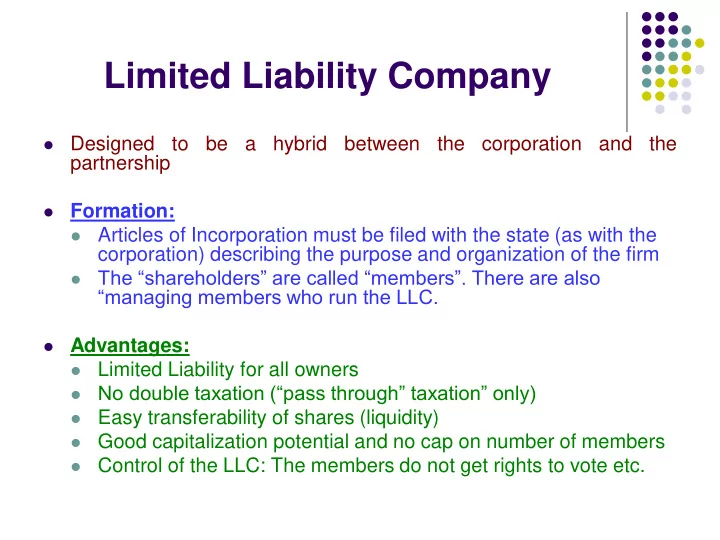

Limited Liability Company Designed to be a hybrid between the corporation and the partnership Formation: Articles of Incorporation must be filed with the state (as with the corporation) describing the purpose and organization of the firm The “shareholders” are called “members”. There are also “managing members who run the LLC. Advantages: Limited Liability for all owners No double taxation (“pass through” taxation” only) Easy transferability of shares (liquidity) Good capitalization potential and no cap on number of members Control of the LLC: The members do not get rights to vote etc.
Professional Company This and other types of specialized companies have been created by states mainly for firms and companies delivering professional services such as law firms, doctors’ practices, etc. General Rules: Rules vary state to state Similar to a corporation; when money is given out the members, it is done so as “dividends” Only relevant to groups of professionals in a particular service industry; and no one who is not a professional in that industry can own a stake in the PC Liability: the members are usually personally liable for over-all debts of the PC, but usually not for torts committed by one of the members Many of these have been replaced by the LLC
S Corporation Not really an entity type in and of itself; the S Corp is just a manner in which a corporation can elect to have itself treated when filing its tax return Advantage: Allows “pass through” taxation (avoids double taxation) simply by “checking the box” on the tax return to be considered an s-corp. Formation: Simply start a “regular” c-corp and elect to be treated as an S corp.
QUIZ TIME!
Form 2553 – S Corp Election
S Corporation - Requirements Must be a U.S. domestic corporation Shareholders may only be individuals, estates, or some trusts and the company cannot be a member of a group of corporations. Types of trusts that can hold S Corp stock include: Grantor trusts QSST ESBT The corporation may have only one class of stock There must be fewer than 100 (formerly 75) shareholders for the firm No shareholder can be a non-resident alien in the U.S
Recommend
More recommend